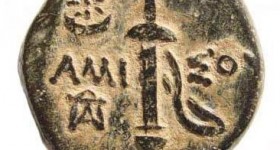Academic Jobs in Ancient History
This week I took notice of a THES blog written by the Insecure Scholar. He lamented the fact that he is receiving invitations to teach at universities as a guest lecturer but none of these institutions is willing to give him a permanent job. At a moment of frustration I answered that he may be the best scholar in the world but this does not mean that universities are willing to pay money for his scholarly skills. Unfortunately, I have not expanded on this idea and this may have caused uncertainties. I intend to clarify here what I meant.
I am not insensitive to the needs and disappointments of the Insecure Scholar. After all I was in his/her shoes until comparatively recently. I spent four years after my PhD trying to get Postdoctoral Fellowships and a series of part-time jobs in order to survive (both in physical and professional terms). During this time I was trying to get a permanent job in Ireland, the Celtic Tiger of the European Union. I kept applying and reapplying for every available post but my efforts did not yield any positive results. Every time I was rejected I looked back at my cv. Initially, I thought that my articles and forthcoming-contracted books were not adequate for the post. Or, maybe, my considerable teaching experience did not meet the strict standards of the Irish Universities! Of course, when I realized that the successful candidates have not even finished their PhDs, my confusion reached unprecedented levels.
I consider myself fortunate to have landed a job in Leicester, after sending my second application for a post in a British University. Now, from the inside, I realize that UK Universities are not that different from the Irish ones. A list of publications and part-time teaching posts under no circumstances do they guarantee a post in ancient history. I have seen so many excellent candidates over the last few years. All of them send one application after another and get one interview invitation after another, without being able to get a contract or permanent position. The reasons for being rejected are as many as the candidates themselves. They may have too many or too few publications or articles in the wrong journals or wrong edited collections. Or their topic may not be exactly what the department is looking for. Or they may be too traditional or too modern. Or they may be coming from countries outside the European Union. Or… In a nutshell, they do not “fit”. UK Universities are desperate to find a combination of attributes in each candidate, which will prove that s/he will easily integrate himself/herself in the department. Once the scholar is integrated s/he will have to prove that s/he can contribute financially to the glory of the department.
So, please, do not despair, if the job does not come up immediately after you finish your PhD. There is not one recipe that may guarantee a post. There is, of course, advice one can give e.g. on writing a cover letter or on presenting yourself in an interview. Beyond that, it is anybody’s guess, who will be hired.




PhDs, publications, books & articles, academic prominence are all part of the academic side of the whole issue. But when it comes to getting a JOB relevant to all the above things, then it automatically becomes a financial issue. A job means that money changes hands, so it all becomes a matter of supply and demand. Even academic institutions have budgets and accountants.
I agree. Do not despair. Just do not take it for granted that being a great scholar will be financially rewarding. It will be academically rewarding, although knowledge is not edible…